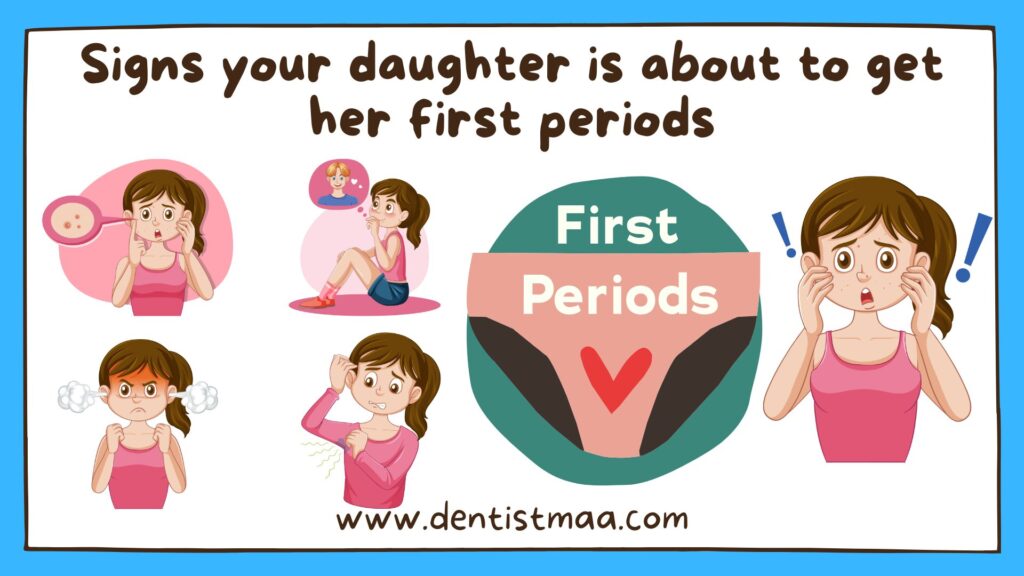As parents, we watch our children grow and develop, marvelling at each milestone. One of the most significant changes in a young girl’s life is the onset of her first period (menstruation). This natural process marks the beginning of puberty and can be both exciting and overwhelming for girls and their parents alike. Being prepared and knowing what to expect can make this transition smoother for everyone involved. It is a parent’s responsibility to prepare their daughter well in advance so that there are no surprises.
In this comprehensive guide, we’ll explore the various signs that indicate your daughter may be approaching her first period. We’ll discuss physical changes, emotional shifts, and how to prepare both yourself and your daughter for this important life event.
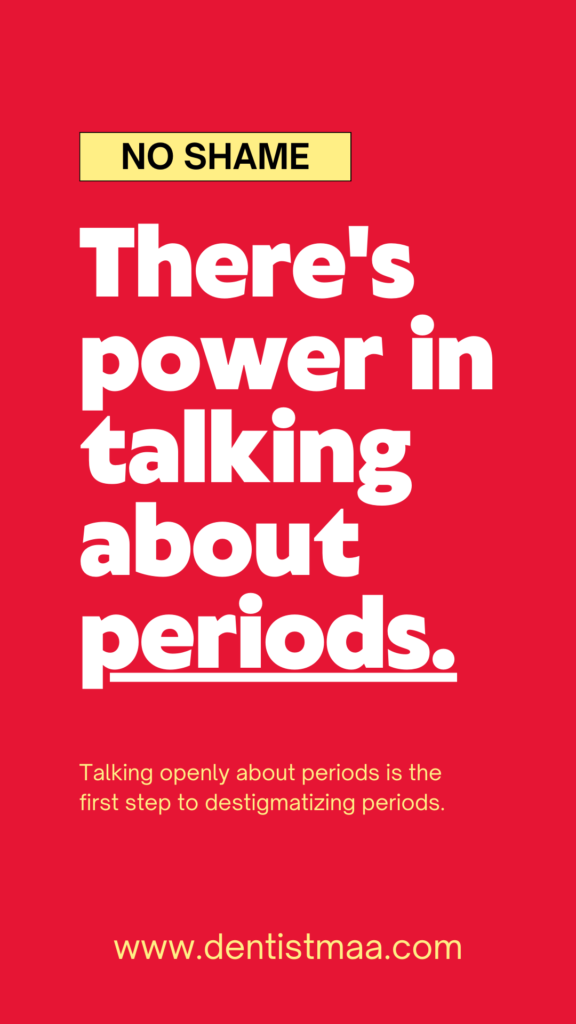
Understanding Puberty and Menstruation:
Before diving into the signs, it’s crucial to understand what puberty and menstruation entail:
Puberty is the process of physical changes through which a child’s body matures into an adult body capable of sexual reproduction. For girls, this typically begins between the ages of 8 and 13, though it can vary.
Menstruation, often referred to as a period, is the regular discharge of blood and mucosal tissue from the inner lining of the uterus through the vagina. It’s a normal, healthy part of a woman’s reproductive cycle.
The average age for a girl to get her first period is 12, but it can happen as early as 8 or as late as 16. Genetics, nutrition, and overall health can influence when menstruation (first period) begins.
Physical Signs Your Daughter is Approaching Her First Period
1) Breast Development: One of the earliest signs of puberty in girls is the development of breast buds. This usually occurs around age 10-11 but can start as early as 8 or as late as 13. You might notice small, tender lumps under one or both nipples. Over time, the breasts will continue to grow and develop.
2) Growth Spurt: Many girls experience a significant growth spurt in the year or two before their first period. You might notice your daughter outgrowing clothes and shoes more quickly than usual.
3) Body Hair Growth: The growth of pubic and underarm hair typically begins after breast development has started. Initially, this hair will be soft and straight, gradually becoming coarser and curlier.
4) Changes in Body Shape: As puberty progresses, you might notice your daughter’s hips widening and her waist becoming more defined. This is due to the redistribution of body fat, preparing her body for potential future pregnancies.
5) Vaginal Discharge: An increase in vaginal discharge is a common sign that the first period is approaching. This discharge is usually clear or white and may appear on your daughter’s underwear. It’s the body’s way of keeping the vagina clean and healthy.
6) Acne: Hormonal changes during puberty can lead to increased oil production in the skin, resulting in acne. This might appear on the face, chest, or back.
7) Body Odour: Increased sweating and the development of new sweat glands can lead to body odour. This is a normal part of puberty and can be managed with good hygiene practices.
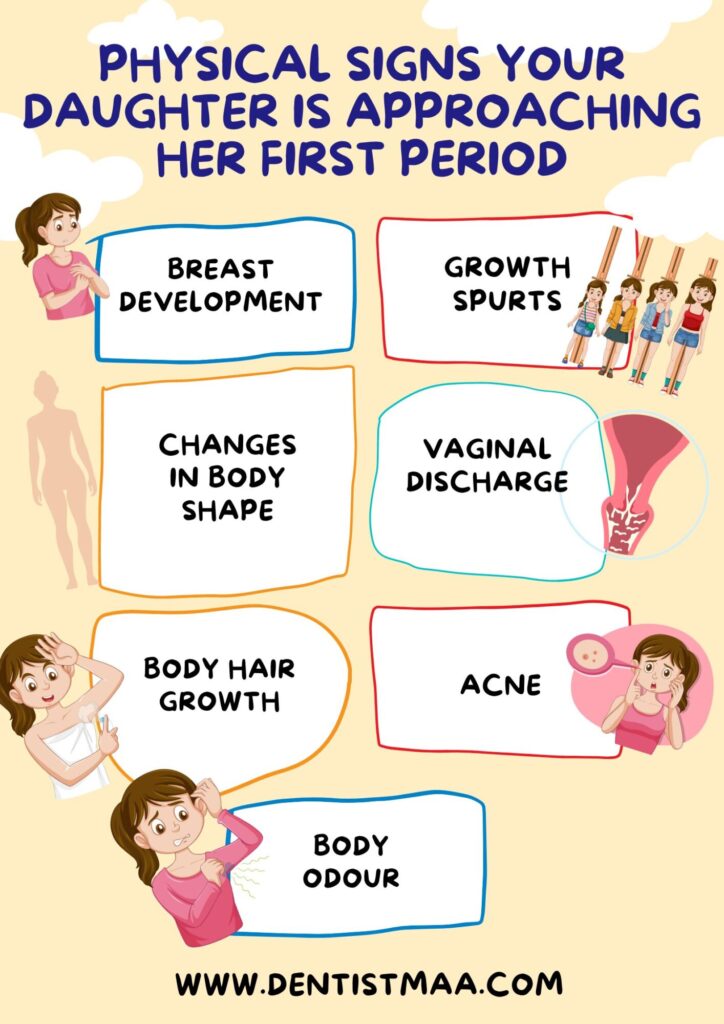
Emotional and Behavioural Signs
While physical changes are more noticeable, emotional and behavioural shifts are equally important indicators:
1) Mood Swings: Hormonal fluctuations can lead to sudden mood changes. Your daughter might feel happy one moment and upset the next, often without a clear reason. Do not worry as it is completely normal.
2) Increased Interest in Privacy: As her body changes, your daughter may become more conscious of her appearance and desire more privacy, especially when changing clothes or bathing. It is a good thing as the child will know that privacy is an important thing. It should be encouraged.
3) Interest in Puberty and Reproduction: She might start asking more questions about puberty, periods, and how babies are made. This curiosity is natural and should be encouraged. Answer all her questions in simple language. You should be the one to tell her everything and not someone else.
4) Changes in Social Dynamics: You might notice changes in her friendships or increased interest in romantic relationships. It is normal at this age, and you need to worry less. Just know who your child is meeting, and tell her to be safe and aware of her surroundings at all times.
5) Fatigue: The physical changes of puberty require a lot of energy. Your daughter might seem more tired than usual. Give her a good diet and lots of fluids.
6) Increased Emotional Sensitivity: She may become more sensitive to criticism or more easily embarrassed. In such cases, you need to keep your calm and be polite and understanding with her. The stage will pass.
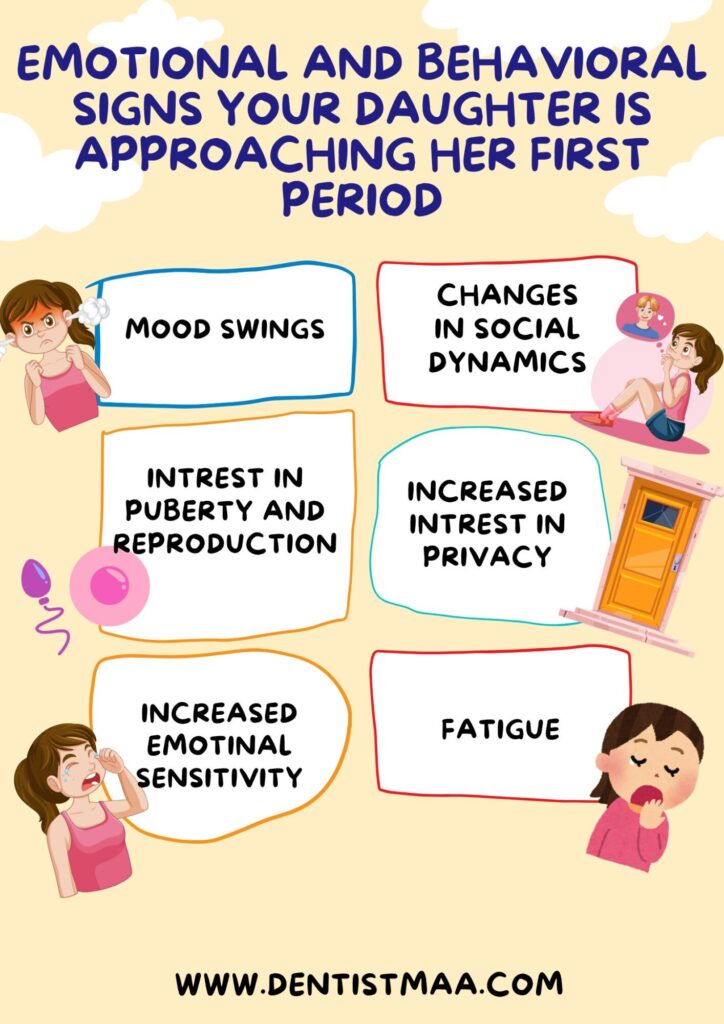
How to Prepare Your Daughter for Her First Period
Being proactive in preparing your daughter for menstruation can help ease anxiety and ensure she feels supported:
1) Open Communication: Create an environment where your daughter feels comfortable asking questions about her body and the changes she’s experiencing, without any judgment or hesitation. Answer every question she has. Now is the right time.
2) Educate Early: Start discussions about puberty and menstruation before the physical signs appear. This gives her time to process the information without feeling overwhelmed. If she knows about it already, she will feel more comfortable when she gets her first period, as she already knows about it.
3) Provide Resources: There are many excellent books and websites designed to help girls understand puberty and menstruation. Share these with your daughter.
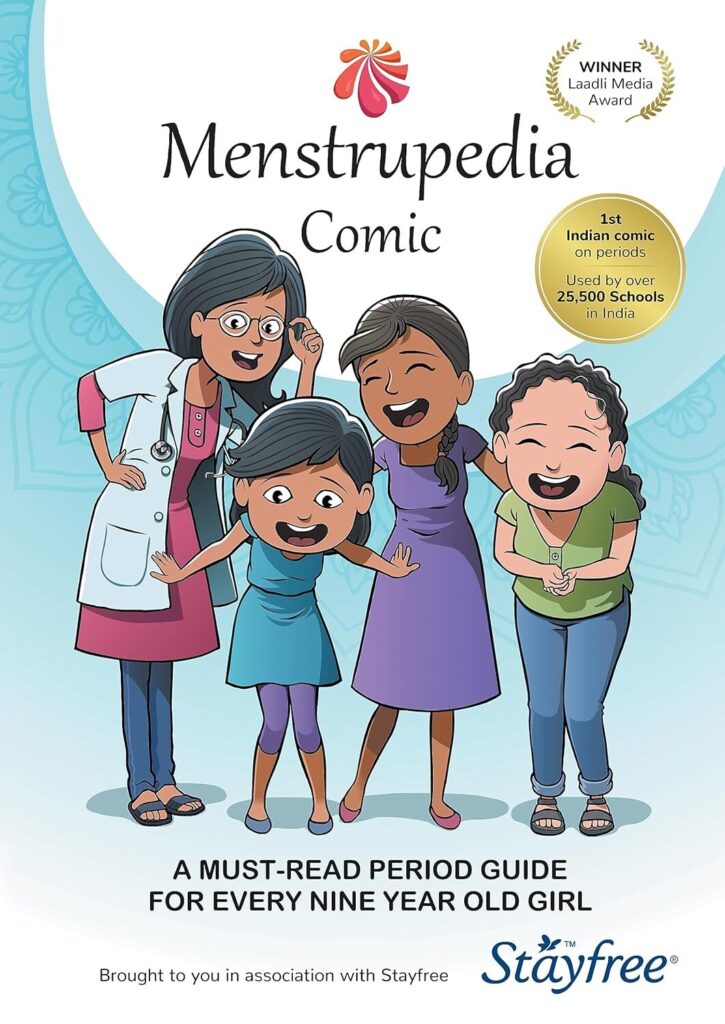
4) Prepare a Period Kit: Help your daughter put together a small kit with pads or tampons, a change of underwear, and maybe some pain relievers. She can keep this in her school backpack or locker.
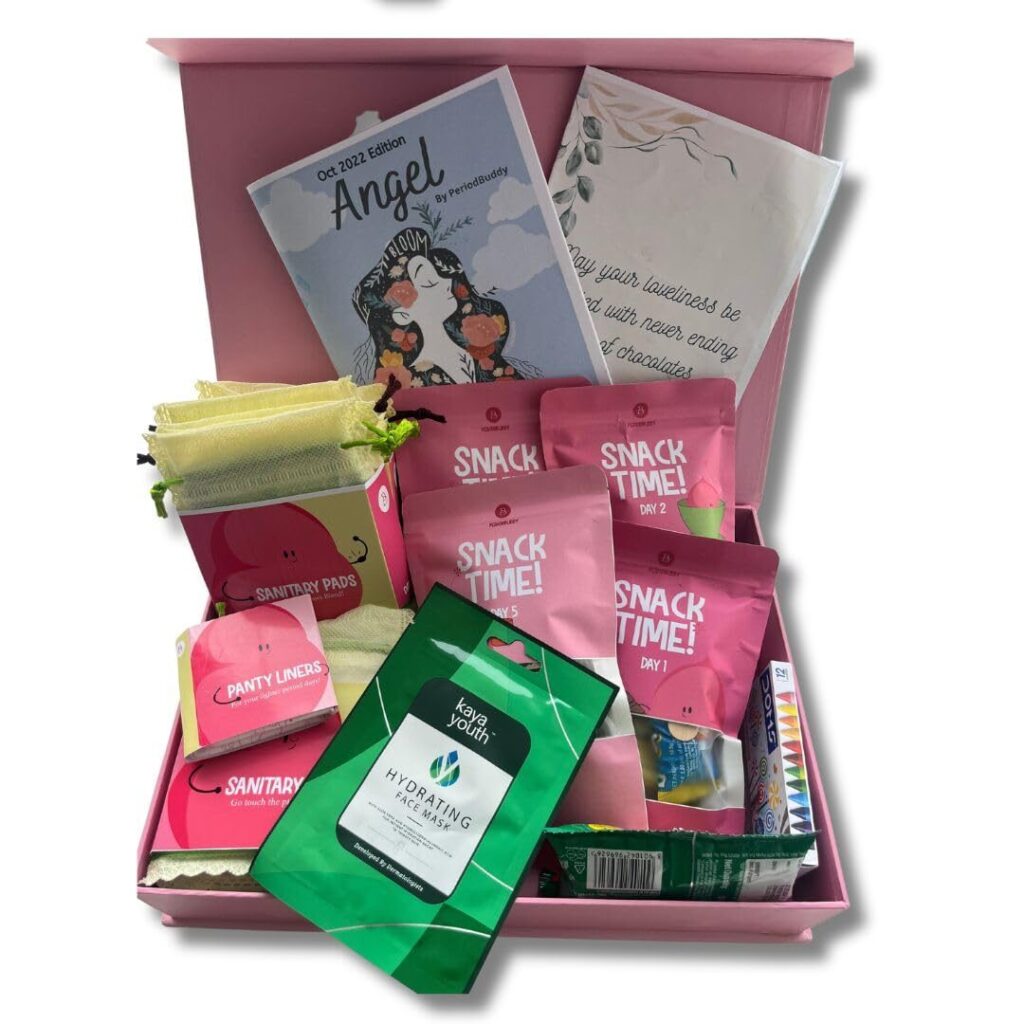
5) Demonstrate How to Use Menstrual Products: Show your daughter how to use pads or tampons and how to dispose of them properly.
6) Discuss Hygiene: Explain the importance of changing pads or tampons regularly and maintaining good overall hygiene during menstruation.
7) Address Potential Symptoms: Discuss common period symptoms like cramps, bloating, and mood changes, and ways to manage them.
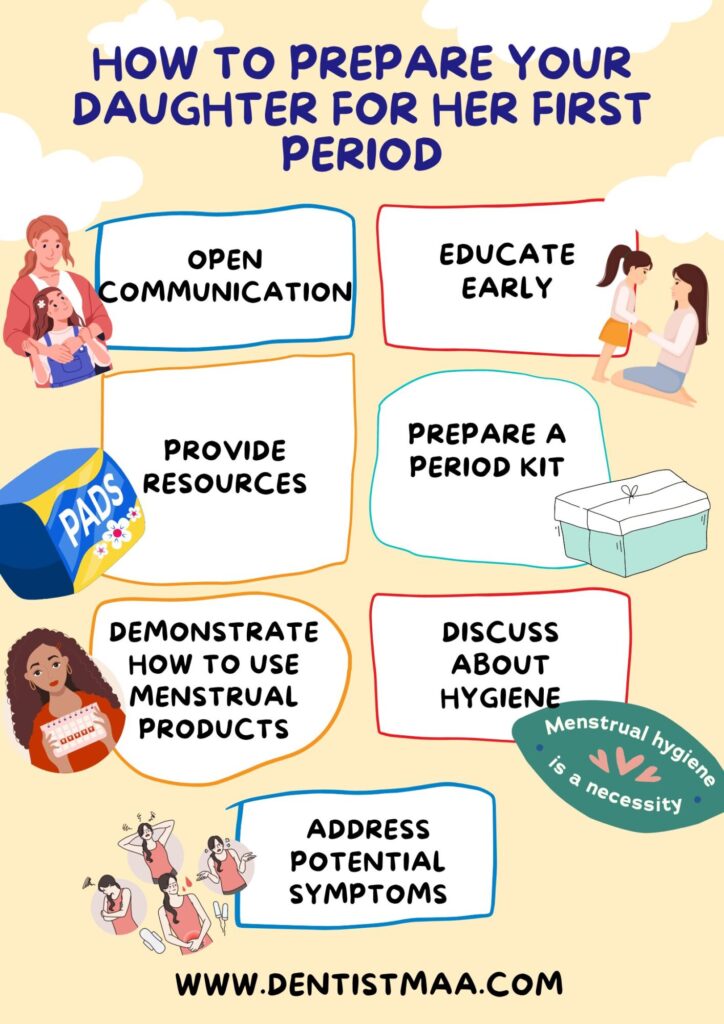
What to Do When The First Period Arrives
When your daughter gets her first period, here are some steps to take:
1) Stay Calm and Positive: Your reaction will significantly influence how your daughter feels about this event. Remain calm and congratulatory. Hug your daughter and tell her it is normal and she is just growing up
2) Provide Practical Support: Help her use a pad or tampon if needed and ensure she has an adequate supply. She will feel uncomfortable in the beginning, but ensure her that she will eventually get used to it.
3) Explain What’s Normal: Discuss the typical length of a period, the amount of blood flow, and what colour to expect. Answer all her questions so that she understands what is happening to her body, and doesn’t feel she has missed out on something.
4) Track the Cycle: Encourage her to start tracking her periods. This can be done with a calendar or a smartphone app. This will help her know when she will be getting her next period, and she will be prepared for it. Sometimes in the beginning, the periods are not regular, and it is completely normal.
5) Discuss Pain Management: If she experiences cramps, discuss options like drinking more fluids, heat packs, or gentle exercise. You can also give her over-the-counter painkillers if she feels very uncomfortable.
6) Celebrate: Some families have traditions to mark this milestone. Consider doing something special to acknowledge this important step in her life if she is comfortable. If not, you can just take her for a nice dinner or gift her, her favourite thing.
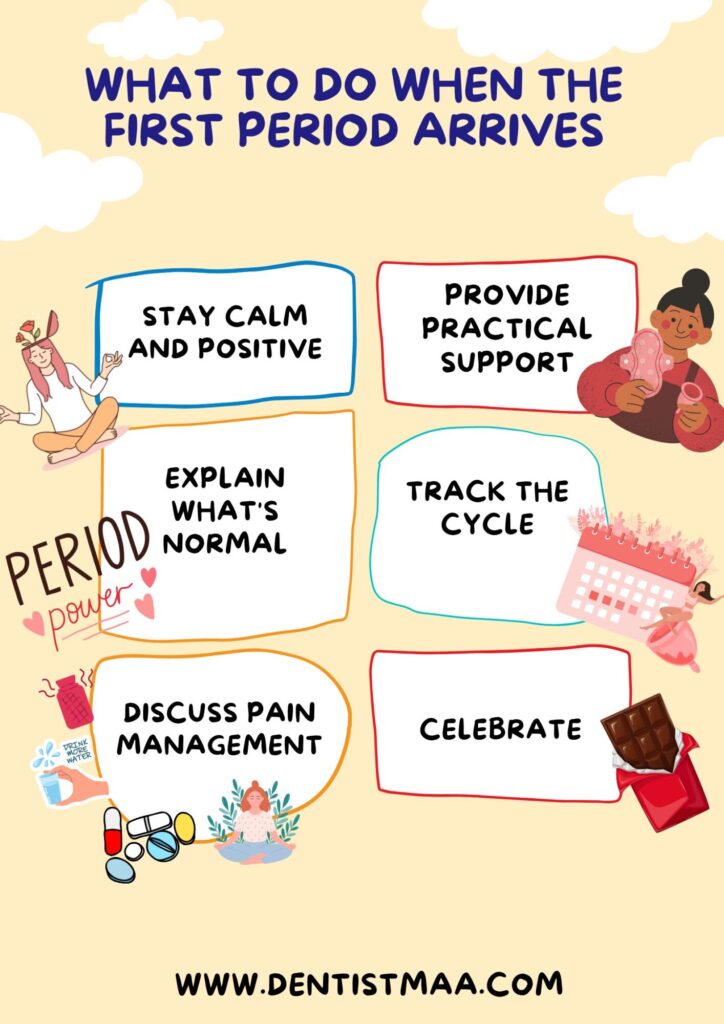
Common Concerns and Questions
Address some common worries your daughter might have:
a) “Will it hurt?” Explain that while some girls experience cramps, the actual flow of menstrual blood is usually painless. Tell her you are there for her, whatever she needs.
b) “What if I get my period at school?” Discuss strategies for handling this situation, like using the period kit you prepared together. Keep it in her bag when you notice the signs that she is close to getting her first period. It will help her stay calm. Tell her if she needs help, she can always ask one of her teachers for it.
c) “Can people tell I’m on my period?” Reassure her that menstruation isn’t noticeable to others when using proper hygiene products. And if someone else gets to know, it is still fine, and there is nothing to worry about. Tell her getting periods is not taboo, and to stay away from bullies.
d) “Will I get my period every month?” Explain that it’s normal for periods to be irregular at first, but they should eventually settle into a more predictable pattern. You can also get a gynaecological consultation if you feel the need.
When to Consult a Doctor (Gynaecologist)
While variation is normal, there are times when professional medical advice should be sought:
- If your daughter hasn’t started her period by age 15. (The average age of starting the first period is 12.)
- If she experiences extremely heavy bleeding or severe pain.
- If her periods are very irregular after the first year.
- If she has extreme mood changes that interfere with daily life.
Conclusion
The journey to womanhood is a significant and sometimes challenging time for both daughters and parents. By being aware of the signs that the first period is approaching, you can help your daughter navigate this transition with confidence and ease. Remember, every girl’s experience is unique, and there’s a wide range of what’s considered normal.
As parents, we provide support, information, and a safe space for our daughters to express their feelings and ask questions. By approaching this topic openly and positively, we can help our daughters embrace this natural and important part of their development.
Embrace this opportunity to strengthen your relationship with your daughter and guide her through this important milestone. With the right preparation and support, the onset of menstruation can be a positive experience that empowers your daughter and deepens your bond.
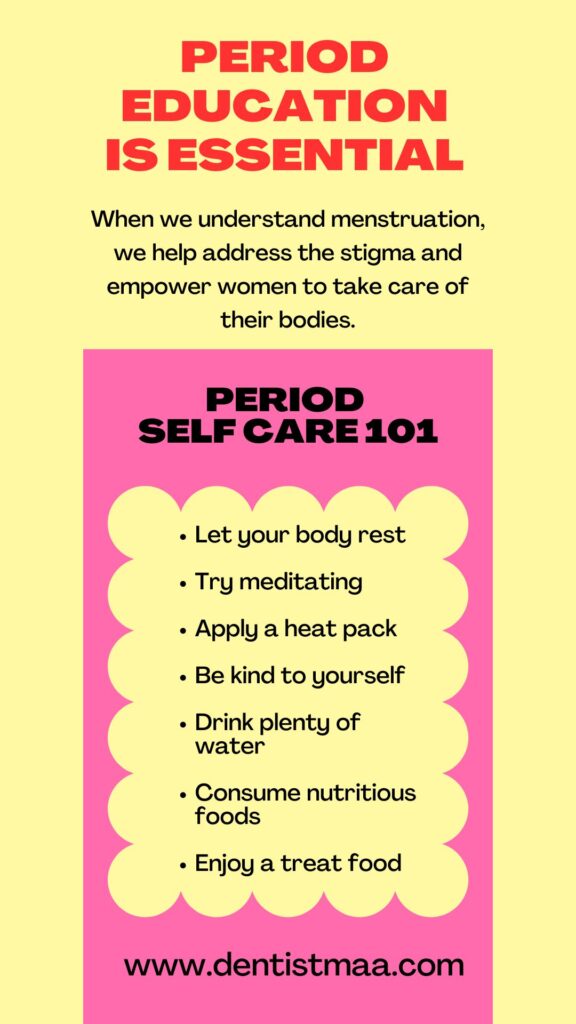
Frequently Asked Questions
What is it like to have periods?
Initially, it is not very pleasant to have periods as you might have menstrual cramps (pain in the stomach, backache, weakness, etc). You will have to wear a pad or a tampon, which would be uncomfortable at first. However, eventually, you become accustomed to it. You will find ways to soothe yourself and your go-to menstrual hygiene products. It is a completely natural process. If you are experiencing unbearable pain, consult a gynaecologist.
How do you reduce menstrual cramps?
Apply Heat – Use a heating pad or a warm water bottle on your lower abdomen to relax the muscles and relieve pain.
Stay Hydrated – Drink plenty of warm water or herbal teas to reduce bloating and ease cramps.
Gentle Massage – Massaging the lower abdomen with essential oils (like lavender or peppermint) may help.
Exercise & Stretching – Light physical activity, like yoga or walking, can improve blood circulation and reduce cramping
Pain Medicines- You can take medicine for the pain if you are uncomfortable.
Why do people get stomach pain during periods?
The stomach pain you get during periods is menstrual cramps. They occur when the muscles of the uterus contract to shed its lining. This comes in the form of pain. Some have a lot of pain, and some have no pain at all. Every body is different.
How long does a period last?
A period can last approximately 2-7 days. A woman sheds around 20-90 mL (approximately 1 to 5 tablespoons) of blood during each menstrual period.
What are the signs of a girl getting her first period?

1. Breast Development
2. Growth Spurt
3. Changes in body shape
4. Vaginal discharge
5. Body hair growth
6. Ache
7. Body Odour
How can I prepare my daughter for her first period?
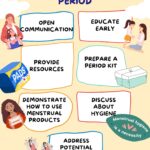
1. Talk to your daughter freely
2. Educate early
3. Provide resources like books or videos
4. Prepare a period kit
5. Demonstrate how to use menstrual products
6. Discuss hygiene
7. Address potential symptoms
Also Read: 10 Tips to Teach Your Child for Body Safety
📨 Have a question about your child’s or your dental health, or parenting? We’d love to help. Email us at garimaverma@gmail.com and we’ll get back to you soon!

